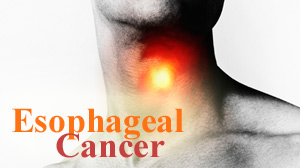Esophageal Cancer Causes, Symptoms, Diagnosis and Treatment

What Is Esophageal Cancer?
Esophageal cancer is a cancer arising from the esophagus—the food pipe that runs between the throat and the stomach. Although it can occur anywhere along the esophagus, it commonly occurs in the lower portion of the esophagus.
The two sub-types of this cancer are esophagus squamous-cell carcinoma and esophageal adenocarcinoma. The former is more common in developing countries while the latter is common in developed countries.
Squamous-cell carcinoma arises from the epithelial cells that line the esophagus. In contrast, adenocarcinoma arises from glandular cells present in the lower third of the esophagus, often where they have already transformed to intestinal cell type (a condition known as Barrett’s esophagus).
The disease is diagnosed by biopsy done by an endoscope. Prevention includes stopping smoking and eating a healthy diet.
Treatment is based on the cancer’s stage and location, together with the person’s general condition and individual preferences. In the presence of extensive disease or if the affected person is not fit enough to undergo surgery, palliative care is often recommended.
Outcomes are related to the extent of the disease and other medical conditions, but generally tend to be fairly poor, as diagnosis is often late. Five-year survival rates are around 13% to 18%.
Causes Of Esophageal Cancer:
The definite cause of esophageal cancer is not fully understood.
It occurs after genetic mutations in cells of esophagus. This causes the cells to divide uncontrollably. The accumulating cells then form a tumor which may spread.
The most common cause of the squamous-cell type of esophageal cancer is:
- Tobacco use
- Alcohol consumption
- Drinking hot drinks
- Poor diet
The most common cause of adenocarcinoma type is:
- Smoking
- Tobacco use
- Obesity
- Acid reflux
Moreover, the following factors are likely to increase the risk of developing esophageal cancer:
- Difficulty in swallowing because of an esophageal sphincter that won’t relax (achalasia)
- Eating few fruits and vegetables
- Having gastroesophageal reflux disease (GERD)
- Having precancerous changes in the cells of the esophagus (Barrett’s esophagus
- Undergoing radiation treatment to the chest or upper abdomen
Symptoms Of Esophageal Cancer:
Esophageal does not exhibit symptoms until it has reached an advance stage. This is why it does not have a high survival rate.
Possible symptoms may include:
- Difficulty in swallowing
- Weight loss
- Pain when swallowing
- A hoarse voice
- Enlarged lymph nodes (glands) around the collarbone
- A dry cough
- Coughing up or vomiting blood
Diagnosis Of Esophageal Cancer:
The following procedure in conducted in order to diagnose esophageal cancer:
- Examining the esophagus via a scope (endoscopy)
- Collecting a sample of tissue for testing (biopsy).
Treatment Of Esophageal Cancer:
The following treatment options are available:
- Surgery
To remove small tumors
To remove part of the or entire esophagus - Chemotherapy
- Radiation therapy
Related Articles:
Thyroid Cancer Causes, Symptoms, Diagnosis and Treatment
Vaginal Cancer Causes, Symptoms, Diagnosis and Treatment
Rectal Cancer Causes, Symptoms, Diagnosis and Treatment
Testicular Cancer Causes, Symptoms, Diagnosis and Treatment
Vulvar Cancer Causes, Symptoms, Diagnosis and Treatment
Gallbladder Cancer Causes, Symptoms, Diagnosis and Treatment
Pancreatic Cancer Causes, Symptoms, Diagnosis and Treatment
Case Seeking Cancer Screenings Heads To Trial
Solid Organ Transplant Patients At Higher Cancer Death Risk
A Sort Of Prostate Cancer Treatment May Upsurge Probabilities Of Alzheimer’s
Oral Cancer Causes, Symptoms, Diagnosis and Treatment
Ovarian Cancer Causes, Symptoms, Diagnosis and Treatment
Alkaline Diet Helping In Cancer and Other Syndromes
By : Natural Health News




